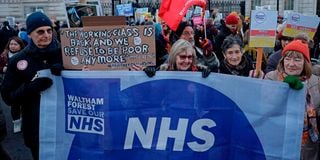Personal experience of British health service performing at its best

People hold placards at the end of a protest march, outside 10 Downing Street in London on January 18, 2023, organised by Doctors Association UK, NHS Workers Say No! and NHS Staff Voices in support of the ongoing pay disputes.
Day by day we hear horror stories about our beloved National Health Service, of nurses and ambulance men on strike for better pay, hospital corridors choked with patients on trolleys, medical staff overworked, and operations postponed.
In the North East alone last December, 1,911 sick people waited more than three and a half hours for an ambulance to take them to the hospital. Some were suffering from suspected strokes or heart attacks.
“It never used to be like this” is a common complaint, and that is true, but you could argue that it is also inevitable.
The NHS was created in 1948 when the population of the United Kingdom was just over 50 million, compared to 67.5 million today.
What’s more, people live much longer now, ironically due in part to the ministrations of the Health Service.
Founding precept
Despite all the problems, however, the NHS remains true to its founding precept – that it should be free at the point of delivery, whether this is a meeting with your GP or an operation which might cost thousands in other countries.
I had a personal experience recently of the National Health Service at its best. My doctor suspected that my heart was not performing at its best and arranged that I should undergo an echocardiogram at a local hospital.
A letter of the appointment arrived in due course with details of where to go, what to do etc, plus a booklet explaining all about echocardiograms.
I noticed with dismay that I was scheduled on a day when the nurses were due to strike. However, when I arrived, I learned that the hospital was an exception on that day. I found a seat. My appointment was for 10:40 am. I was called at – 1040 am.
An echocardiogram is an ultrasound examination of the heart. You will recognise it if you have ever watched a medical programme on television where experts examine the child in the womb of a pregnant mother. A scanner is traced over her skin and the embryo shows on a TV-type screen.
In my case, no babies were spotted, but the condition of my heart was assessed over 30 minutes under the gyrating scanner, with audible sounds ranging from peeps and beeps to the swishing noise of seashore waves.
No pain, no real discomfort, but it was good to wipe off the cold jelly facilitating the scanner’s movement when the procedure ended.
Best of all was to hear the nurse say, “I can find nothing particularly alarming. I’ll send a detailed report to your doctor.”
Thank you, nurse, and thank you NHS.
* * *
Nothing to do with heart problems, but a useful tip from a study in America: taking statins can reduce the risk of dying from Covid by more than a third.
The cholesterol-destroying drug combats severe symptoms such as breathing problems and chest pains.
* * *
Readers of this column may remember a horrifying story back in 2019 when an 18-year-old youth threw a six-year-old French boy from the 10th-floor balcony of the Tate Modern art gallery in London.
The youth, Jonty Bravery, was convicted of attempted murder and jailed for a minimum of 15 years.
Reports at the time said the French boy survived but suffered a bleed to the brain and fractures to his spine and would need lifelong care.
Last week, the boy’s family said he had made “considerable progress” in the intervening years. He was raking part in adapted archery contests and a form of judo and he had made much progress in swallowing and breathing.
“Our son remembers more and more things he does during the day and received very positive school results,” a statement said.
* * *
A devout young man decided to become a monk and joined a very severe order. One of the rules was that monks could only speak two words a year.
At the end of his first year, the young monk went to his abbot and said, “Bed hard.” After the second year, he said, “Food terrible.” After the third, he said, “I’m leaving.”
Said the abbot, “Good riddance, you’ve done nothing but complain since you got here.”
* * *
A Catholic, a Baptist and a Methodist went fishing. No sooner were they anchored in the middle of the lake than the Catholic realised he had forgotten his bait. So he got out of the boat, walked across the water to the shore and retrieved his bait.
When it came time to eat, the Baptist remembered that he had forgotten their picnic basket, so he walked over the water and brought back the food.
“Hey,” said the Methodist, happily, “this is great,” and jumping out of the boat sank straight to the bottom.
The Catholic turned to the Baptist and said, “Should we have told him where the rocks are?”





